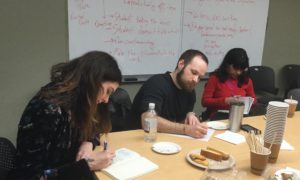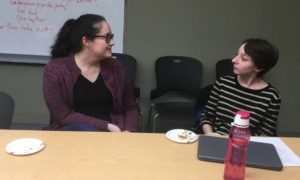Guest blogger, Josh Barsczewski, is a PhD candidate in Rhet/Comp at the UMass Amherst. He teaches the first-year writing courses in the Writing Program , where he also serves as a mentor to first-year teachers. Josh has also served as the Assistant Director of the UMass Writing Center.
If you ask your fellow Writing Program colleagues how they handle the required “Interacting with Texts” conferences, you’ll hear a lot of different ideas. Some hold 20 minutes conferences with each student; some spend 30 minutes or more. Some read the Unit 2 drafts ahead of time; some read during the conference itself. Still others try group conferences where they act more like facilitators of a peer review session rather than an “instructor” per se. There hasn’t typically been a lot of training around the Whys and Hows of conferencing because they aren’t something we do every day. But that doesn’t mean they aren’t important, or that there aren’t some techniques to help make them more productive and enjoyable! Last Friday, (2/8/2019) Shannon Mooney, Stacie Klinowski, and I led an informal workshop/conversation on how to conference with students. Shannon, Stacie and I all have experience working in Writing Centers, where one-on-one pedagogy is key. So, we decided to share some of the tips and ideas we use to help students one-on-one.
Some ideas we talked about:
*Have a goal for your conferences. What do you hope to achieve? Do you want students to think more complexly? Then maybe prepare a few higher-level questions ahead of time that you can ask each student that might help them develop their ideas. Are you more focused on making sure students can summarize and paraphrase well? Then focus your session primarily on those things. For example, if you’re more concerned with organization, structure, or audience awareness, you don’t need to feel compelled to discuss grammatical errors.
*Think about where in the unit you’re scheduling your conferences. If you schedule conferences earlier, then you might want to focus on generative writing, brainstorming, and asking open-ended questions. Being comfortable with silence as students figure out what they’re thinking is key! If you schedule conferences after the initial draft, maybe you can focus on global revision strategies. But if you wait until later, maybe you should focus just on specific parts of the essay or sentence-level concerns.
*Focus on patterns and don’t think you need to cover everything. When we work one-on-one, we might feel compelled to share all of our tips and advice with students, but think of this from the students’ perspective. In trying to help them, we might be overloading them. Instead, it would be better to focus on a few things that we can cover in depth.
*Make the student do the work. If we put pressure on ourselves to do too much, we can quickly burnout! To help lift the burden off of yourself, make plans so that the student has to do most of the reading, note taking, thinking and writing. For example, have students come prepared with questions to ask you so you don’t need to think as much on the fly. Or, have students read their own papers out loud so you don’t have to pre-read or try to read quickly while they’re sitting next to you. You might even try just talking through the essay without reading it: see if your student can summarize what they themselves have written. If they can’t, they might need to go back on their own and figure out what they’re doing.
*Try to do some writing in the conference itself. Conferences don’t need to be just about talking! Most writing tutors will tell you that some of the most productive moments of tutorials are when the tutor steps back and the writer actually tests out what has been discussed. We can do that with our students too. If you suggest a new organizational strategy, for example, maybe take a step back and let your student have some silent time to write and see if the idea works for them. If it feels awkward sitting there while they write, you can take a step outside. Sometimes I like to walk around the perimeter of the 13th floor; after one trip around, I’ll check in on my student. If they want more time, I’ll walk around again.
Above all, keep in mind what we’re there for. Years ago, Stephen North declared the axiom around which Writing Centers operate when he said “Our job is to produce better writers, not better writing.” That’s true in many ways for College Writing too, and certainly keeping this adage in mind can help us plan our conferences. Getting the student to write a perfect “Interacting with Texts” paper after our conference is a less achievable goal than helping them build writerly skills to carry forth throughout College Writing and beyond.
The Resource Center staff of the UMass Writing Program is hosting a series of Coffee Chats for Spring 2019 semester. Each Chat will take up a topic related to the teaching of writing. Chats will be held on the following Fridays (2/22, 3/22, 4/5, 4/19) from 2:30-3:30 in 1321 Du Bois Library. Coffee and snacks will be served! Looking forward to seeing you there!



